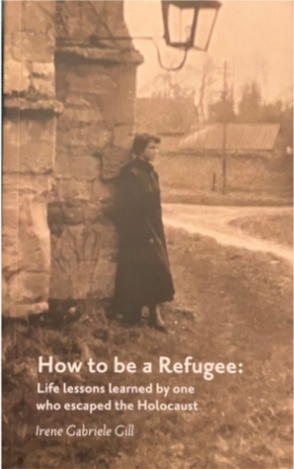Life Lessons Learned by One Who Escaped the Holocaust
Glen Williams
Oxford Quaker Irene Gill has written a truly remarkable book about the first 90 years of her life. Entitled How to be a Refugee, her book starts by describing how she, her parents, and her younger brother arrived in Oxford in 1938. Both her parents were part Jewish, and they needed to escape from Nazi Germany. The family managed to settle in Oxford, where her father – a scholar of Ancient Greek language, literature, and philosophy – found employment at the University.

When Irene arrived in Oxford she spoke no English at all. She learned English quickly, but when war between the UK and Germany broke out in May 1939, her whole family suffered. Her father was interned as an ‘enemy alien’, and Irene found herself ostracised and isolated at school. She felt particularly hurt when a fellow pupil repeatedly taunted her as a ‘dirty German rat’.
Nevertheless, Irene attended primary and secondary schools in Oxford, where she made rapid academic progress, passing her A-level exams with flying colours. Rather than going straight on to tertiary studies, she tried to get into acting as a career. This led to some interesting short-term jobs, for example as a props designer, a dance hostess, and a member of a female swimming group – the Mayfair Mermaids – performing ‘water ballets’.
Irene’s life took a turn for the better in 1953, when she enrolled at University College London (UCL) to study German and English. Although she hated academia, she was awarded a First Class degree, and later found that she enjoyed teaching. It was at UCL that she met a fellow student, David Gill, whom she describes in her memoir as “shy and gauche, but kind and intellectually brilliant”. They became a couple and were married in 1958. If ever a marriage was made in heaven, this was it. For the next 60 years, Irene and David’s lives were tightly intertwined and mutually reinforcing.
They moved to Oxford, where David taught English and German at Magdalen College School and also wrote beautiful thought-provoking poetry. Irene taught German at three Oxford language schools. The couple had two boys, Tom and Nick, and also adopted a baby girl, Jackie. They threw themselves into political action in support of the Campaign for Nuclear Disarmament and also campaigned against the war in Vietnam. Irene also started a women’s group called Oxford Aid for Children in Vietnam.
Through all these activities, Irene seemed to be a dedicated, effective, self-confident person. In fact, she was plagued by self-doubt. As she writes in her memoirs, “I felt that there was something fundamentally wrong with me, like a bad smell – a fatal flaw which made me incapable of success. … No doubt It went back to my childhood, when I was an ‘Enemy Alien’, a ‘Jerry’, a ‘dirty little German rat’, when the Germans wanted me dead because I was half-Jewish, and the English wanted me dead because I was German.”
Yet Irene has also received plenty of praise and reassurance from people who have known her and worked with her. A colleague at a girls’ high school in High Wycombe, where she was a teacher, remarked “She brought wonder and delight and rigour into the classroom. … She cared about her students, she cared about her subject, but she never allowed a concern for the subject matter of the lesson to overcome her concern for individuals. She was someone that students could talk to.”
When their three children were reasonably independent, Irene and David went on several long trips – to Israel, Poland, Japan, Vietnam, and Uganda. These came to an abrupt end in 2012, however, when David was diagnosed with dementia. The most poignant chapter of the book is entitled ‘Living with Dementia’. It describes how David descended rapidly into outbursts of uncontrollable behaviour. Irene wrote at the time: “I am a carer now – that’s all. …. It means my days – and nights – are entirely devoted to keeping the routines going: guiding him, coaxing him through the days. Helping him to get up, washed, dressed. The reverse process at bedtime. Trying to keep him active, to stimulate his darkening mind, thinking of games, outings, TV programmes … giving him simple jobs to do, like stirring the soup, or washing up, or putting things away, anything to make him feel useful, to ward off the despair that’s hanging over us both…”
On 11 March 2017, David was transferred from home to the Fullbrook Centre at the Churchill Hospital in Oxford, where Irene visited him every day. The staff reported that David had been furiously resisting the carers’ efforts to move, wash and feed him. On 16 May 2017 he had difficulty in breathing and was transferred to the hospital’s Accident & Emergency Department. On 19 May 2017 David stopped breathing.
Irene came to live in Headington, where she attends Quaker Meeting for Worship on Sunday mornings. She also takes part in a small discussion group of members of the Oxford Friends Meeting, and remains a strongly committed member of the Campaign for Nuclear Disarmament.
Note: Irene’s memoir, How to be a Refugee: Life lessons learned by one who escaped the Holocaust (303 pages), was published in Spring 2022 by the Caseroom Press, and is available at £10 per copy (plus postage) from the author herself: ireneggill@btinternet.com.
| Previous Article | Next Article |
Back to October 2022 Newsletter Main Page
Forty-Three Newsletter • Number 522 • October 2022
Oxford Friends Meeting
43 St Giles, Oxford OX1 3LW
Copyright 2022, Oxford Quakers
